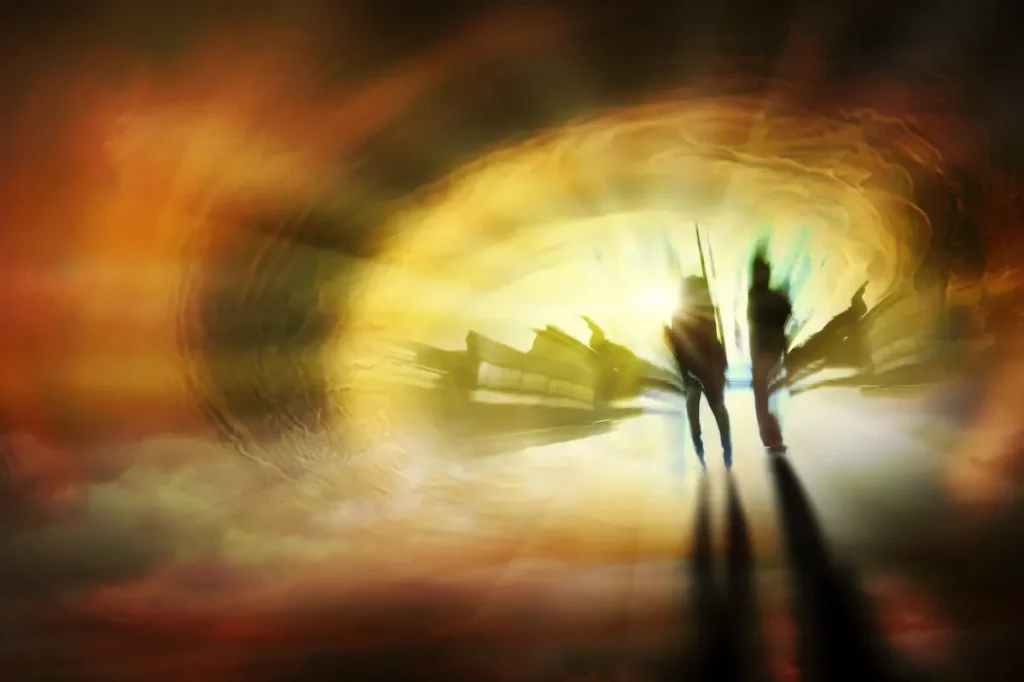Wondering how to meet your dead father or a different deceased relative? It depends on your spiritual worldview and what you want from the meeting. Spiritual processes include prayer, Spiritualist practice, ouija, dream interpretation, and clairvoyant or psychic mediation. Secular strategies involve networking, research, and introspection.
My grandfather died before I was born. Everything I’ve heard of him tells me that he would have been more than a parent but a trusty friend. This suspicion spurs me to want to meet with him, to draw in his wisdom and warmth. But I’ve only ever spoken to those who still live and breathe.
We’ll dive into the how while not neglecting the crucial whens and whys of reaching across the veil.

Related Reading: How To Father-Daughter Dance When Dad is Deceased?
Spiritual Paths For Meeting A Dead Father
If you are inclined to tap into a world outside of what we see, a few spiritual strategies are available. These provide tried approaches to communicating with persons who have left the Earth. Choosing a path that is compatible with your prior religious commitments is key to maintaining the integrity of the self.
We’ll look at a few.
Spiritualism
Spiritualism is a religion that flourished in the United States and Europe from the mid-nineteenth century. Spiritualists refer to the deceased as “discarnate humans” and have rituals to mediate communication with those who have died.
The account of your father, which a Spiritualist medium gives, may differ from what people who remember his life on Earth tell you. This reflects their belief that the discarnate continue to grow in the spiritual realm. They view the afterlife as a dynamic place in which spirits continuously evolve.
In addition to mediating contact with your father, Spiritualists may help you develop the ability to communicate directly. It is a tenet of the Spiritualist faith that mediation is a skill that can be developed, and participating in the life of the church may equip you to develop accordingly.
Psycho-clairvoyant Mediation
Clairvoyants claim a spiritual connection that enables them to communicate with spirits at a distance. This includes the spirits of departed persons. Psychics claim a sixth sense which enables knowledge that defies natural laws.
Both psychics and clairvoyants offer their services as mediums between the living and the deceased. It is important to note that mediums may also offer the ability to communicate with the living. This matters where your father is presumed dead, or the conversation you want requires intercession with an out-of-contact living person.
Mediums are available for face-to-face consultations, as well as online. It is important for both parties that a connection be established. Mediums respond to cues from their client, and the openness of the communication channel is important to facilitate that.
Séance
A séance (French for “session”) is an unmediated session in which an individual or group seeks to establish direct contact with the dead. This may involve props such as Ouija boards and requires a spirit-friendly setting, like a candle-lit or incense-fragrant room.
If embarking on a séance, it is recommended to include an experienced guide. This person may be in the room as it happens or on standby to explain how to respond to cues. It is best to get detailed instructions on how to prepare and execute the séance, including how to breathe and physically comport during the communication.
Judeo Christian Approaches
The Judeo-Christian faiths include Judaism, Islam, and Christianity. These generally discourage mediated spiritual encounters, as occultic practices are viewed as close to evil. Shiite Islam is particularly punitive.
Christianity allows prayers directed at the dead. These do not hold the promise of a reply, but they do fulfill much of the need for connection. Islam has a rich tradition of dream interpretation. While this is beyond the control of the seeker, it does have the possibility of relational interpretations with regard to the deceased.
Related Reading: Father vs. Pastor vs. Priest: What’s the Difference?
Secular Paths For Meeting A Dead Father
Increasing numbers of people identify as physicalists, believing that the material world outlines the limits of reality. To the secular community, as well as religious people whose faiths exclude communication with the dead, there are practical paths for getting to know people who have died. These involve discovering a detailed description of the deceased by uncovering resources in the world of the living.
Social Networking
The people who lived with your deceased father are a good source of information about him. By traversing his social networks, you can meet people with firsthand experience of him. Sources include:
By targeting different sources, you might get a multifaceted view of him, as people tend to show different sides in different contexts.
Research
Your father might have left a paper trail. Reading correspondence and documents authored by or about your father are further sources of information. The following list is not exhaustive:
Conclusion
As Michael Shermer has pointed out, talking to the dead is easy. The hard part is getting them to talk back. Meeting a relative who has moved on can be a fulfilling process. It starts with understanding the path that person has walked while among us and following it beyond the end.

